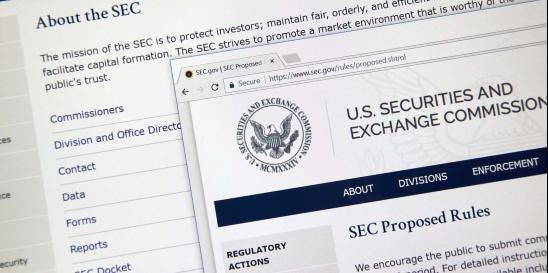The SEC’s recent enforcement settlement involving a fund manager highlights the SEC’s focus on an investor’s “control purpose” triggering the requirement to file on a Schedule 13D as opposed to a short-form 13G. At issue was HG Vora Capital Management’s 5% interest in a public company, and whether it had complied with its obligations to supersede its existing filing with a long-form Schedule 13D filing within 10 days of no longer being “passive.”
Schedule 13G is available to passive investors (over 5%) that acquired shares “not with the purpose nor with the effect of changing or influencing the control of the issuer,” so long as their ownership remains below 20%. The SEC has a broad view of the types of activities that could show such a “control purpose,” or, from the SEC’s point of view, that a “passive intent” no longer exists. Urging the issuer to consider an extraordinary business transaction, for example, or changes in business operations or strategy, could disqualify an investor from “passive” status in the agency’s view. Once a passive intent no longer exists, the investor will no longer be able to file on 13G as a passive investor, and must switch to the longer Schedule 13D. With the SEC’s recent revisions to the rule shortening the filing deadlines, this determination must be made quickly to avoid missing the public filing deadline.
HG Vora filed on a Schedule 13G as of year-end 2021, disclosing it owned 5.6% of the company’s stock. However, from January through mid-April 2022, HG Vora nearly doubled its interest to 9.9% of the total outstanding common stock, all held by an affiliated hedge fund that directly owned the shares. The SEC also noted HG Vora’s additional economic exposure to the company through swap agreements.
According to the SEC order filed to reflect the settlement, we understand the facts as follows. HG Vora had apparently considered ways the company could become more efficient, liquidate non-core business assets, and develop a more efficient capital structure by issuing debt securities. The development of this view, alone, did not change HG Vora’s status as a passive investor. Then it began conversations with a private-equity firm about providing asset-backed financing to the company–still not a control intent.
When did the firm move from passive to active status? HG Vora held discussions with a private-equity firm about an acquisition of the company. On April 26, 2022, HG Vora “first considered making its own acquisition bid” with financial backing from the private-equity firm. As part of this potential bid, HG Vora “began drafting an offer letter” for all of the company’s outstanding common stock. As part of this offer letter, HG Vora included a “’placeholder’ offer price of $85 per share.” According to the SEC, it was “no later than” this date that HG Vora shifted from a passive investor to an activist investor (with Schedule 13D filing obligations within 10 days, on May 6).
On April 27, HG Vora contacted outside counsel to advise on its Schedule 13D filing, and provided counsel with a copy of the draft offer letter shortly thereafter. On May 12, 2022, HG Vora first met with the public company’s management to discuss the potential bid, following up with a letter to management the next day. The proposed purchase price was $86 per share, or a “20.3% premium to [the] common stock’s prior-day closing price…” It was on May 13, when this letter and premium purchase price were transmitted to the public company that HG Vora filed its Schedule 13D.
The SEC found this seven-day delay in filing Schedule 13D violated Section 13(d)(1) of the Exchange Act and Rule 13d-1 thereunder. HG Vora was sanctioned with a $950,000 fine and a cease-and-desist order.
The SEC has recently revised the Regulation 13 D-G rules, shortening the filing deadlines for both Schedule 13Ds and Schedule 13Gs and generally requiring Schedule 13Gs to be amended more frequently, and reflecting a new focus by the agency on the speed and timeliness of filings, and providing additional guidance on when the SEC believes a “group” may be formed between investors. Because a “control purpose” can quickly lead to filing obligations now within five business days, caution is required to avoid triggering inadvertent violations. When engaging with a public company, fund managers and other investors should be mindful that any such engagement could easily land it in a grey area on the question of whether a control intent exists, depending on a historical review of all of the facts. In light of the new filing deadlines and other rule changes, we expect regulators to be highly focused on compliance with the rule.






 i
i


